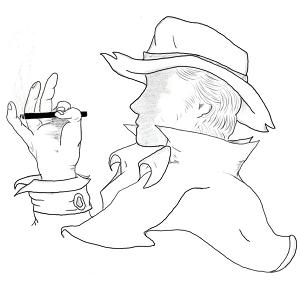Welcome to Flash Pulp, episode four hundred and thirty-four.
Tonight we present Mulligan Smith in Slice of the Pie
[audio:http://traffic.libsyn.com/skinner/FlashPulp434.mp3]Download MP3
This week’s episodes are brought to you by The Human Echoes Podcast!
Flash Pulp is an experiment in broadcasting fresh pulp stories in the modern age – three to ten minutes of fiction brought to you Monday, Wednesday and Friday evenings.
Tonight our private investigator hears the tale of Jimmy Two-Slices and his legally dubious pizza parlour.
Mulligan Smith in Slice of the Pie
Written by J.R.D. Skinner
Art and Narration by Opopanax
and Audio produced by Jessica May
It’d been a hell of a day, and Mulligan wanted nothing more than to sip his slurpee in calm silence.
Walmart Mike, occupying the passenger seat as it nosed its way through downtown Capital City, had other thoughts.
The old man moved to arrange hair he no longer had, then chuckled to himself.
“Your fake paraplegic reminds me of an old pal of mine, Jimmy Two-Slices.
“Jimmy ran a pizza place out of a little house that’d been renovated into a restaurant three owners back. The only thing that changed when he moved in was that he painted every surface, inside and out, tomato-sauce red.
“Now, I say Two-Slices ran the establishment, but it wasn’t exactly like he owned it, if you know what I mean. The deed was in the pocket of fellows higher up the chain, he was just managing.
“I was there for the grand opening, and the food was crap. Tasted like I was eating cardboard slathered in rotten pepperoni. Didn’t matter much though, because, the way the suits saw it, the less business he did the better.
“See, most of what went in and came out of the shop was just on paper. Every Wednesday was a supposed bumper crop of sales. I mean, Jimmy was lucky if he shifted a couple of pies through the door, but the situation went a long way towards covering the inexplicable tax income for quite a number of broken-nosed mouthbreathers.
“Thing is, there wasn’t an evening when I’d wander in there that Jimmy wasn’t singing along to some whiny country song and tossing dough he’d probably never sell. That’s why they called him Two-Slices, by the way: If you were stupid enough to order one, he’d always double it for you because there was so much extra lying around.
“It was quiet though, because most of the boys couldn’t stand his taste in music. I’ve never cared one way or another, so I’d go in when I needed ancient cold coffee and a moment alone. I remember being in there one time, gnawing on a wedge of sand smothered in cheese and watching the flies gather on the windowsill, when a couple lads from the far side of town tossed a brick through the front window.
“Jimmy starts giving the kids what-for, figuring they’re just a pair of a-holes from the block, but we both knew better when a bottle of Smirnoff with a smokey chaser followed.
“Professional job too. Most amateurs overfill their cocktails, which causes no more fuss than a bunch of splashed stink and maybe a small puddle of flame, but these guys knew to give it some room to breathe – as professional as French protesters.
 “My first thought was to get out the door. The flaming gas was making its way across the tomato-coloured floor and counter like a frat boy at a bordello: Hot, heavy, and likely to burn down in seconds.
“My first thought was to get out the door. The flaming gas was making its way across the tomato-coloured floor and counter like a frat boy at a bordello: Hot, heavy, and likely to burn down in seconds.
“Yet there’s Two-Slices shouting ‘Help me!’ and, the thing is, he meant it. That’s when I knew he was in trouble.”
Despite himself, Mulligan raised a brow.
“The Molotov wasn’t a big enough hint?” asked the PI.
“Nah, that’s the cost of doing business. It’s like this: I go on shift at Walley World you know I’m workin’ hard for my minimum wage, but it’s still just a job. I like the people and the paycheck, but if some guy came in with a gun I wouldn’t be getting into a wrestling match over it. If some meathead with a fist full of fire were to try and torch the place I wouldn’t be toastin’ my buns tryin’ to save the friggin’ jogging pants.
“Jimmy though, he’s got his apron off and he’s trying to smother the heat. Well, what if he succeeds? That place wasn’t worth more than the change in my pocket, but I wasn’t about to have my reputation crapped on by having it get around that I hoofed it when Two-Goddamn-Slices stayed to beat back the inferno.
“We got it under control, but there was plenty of smoke damage by the time we were done, and a couple uniforms came around to check what was what.
“‘Just a little problem with the oven,” says Jimbo, and they look from the glass on the floor to the brick and up to the scorch marks nowhere near the kitchen.
“Hell’d be serving Dairy Queen before those guys volunteered for paperwork, though, so they shrugged and took off.
“Still, those up the ladder were not pleased. Better in some eyes to have shepherded the insurance claim through the courts than to have drawn the eyes of even a couple street-walking blueboys.
“It wasn’t two weeks after that that the news came down, though they waited a few months before actually applying the torch, you know, to avoid suspicion. In the end, the near-miss actually gave them some cover, as they could pull in folks who’d swear to the oven already having issues. They even had a legit repairman come in and sign off on the thing once Jimmy was done repainting, just so they could wave his report in front of the judge.
“I wasn’t there for the roast, not my bag, but I heard about the tears Jimmy was leaking when the fire crews arrived. I remember thinking it was a shame too, because, even when he knew it was going to end, he kept on pushing his pies, and he was actually getting pretty damn good at it. He’d even started showing up early to pummel the dough, and the sauces had all started being handmade.
“Got to the point where I wouldn’t even groan when he handed me across a helping.“
The old man paused and smiled at the memory.
Mulligan, his slurpee now empty, slid up the highway’s on-ramp.
“So, are you trying to say that sometimes even when you try you can’t win?’ he asked. “I guess it’s being realistic, but maybe wait for a day when I haven’t lost an insurance fraud paycheck?”
“No, what I’m saying is you gotta consider the flip-side. There’s this idea out there that crime is all cash and ladies with questionable morals, but the truth is – and I know you know it – you don’t rob a chump of his twenty bones because you’re looking to get rich, you do it because you need a sandwich to fill your empty gut. You think those ladies with supposedly questionable morals are there because the pay is good and their dates are gentlemanly good times? No, but everyone’s gotta eat, or, worse, feed their family.
“So one fake wheelchair jockey managed to slip past a Smith: It sucks, but probably not as bad as whatever convinces a fella to spend his entire life looking over his seated shoulder so he can earn enough to cover his shitty apartment’s rent.
“Now quit your whining and I’ll buy you some dinner. I know a place. It may not be the greatest you’ve ever tasted, and the paint may make you feel like you’re trapped in a ketchup bottle, but Jimmy Jr. won’t let us leave hungry.”
Flash Pulp is presented by https://www.skinner.fm, and is released under the Creative Commons Attribution-Noncommercial 3.0 Unported License.
Intro and outro work provided by Jay Langejans of The New Fiction Writers podcast.
Freesound.org credits:
Text and audio commentaries can be sent to comments@flashpulp.com – but be aware that it may appear in the FlashCast.
– and thanks to you, for reading. If you enjoyed the story, tell your friends.

 It was like I was invisible.
It was like I was invisible. Bruno hit his tia, slapped her across the cheek, really, and my Tito gave him some of the same. I can’t imagine there was much force behind his stick arms, but the thug got back in his truck and took off.
Bruno hit his tia, slapped her across the cheek, really, and my Tito gave him some of the same. I can’t imagine there was much force behind his stick arms, but the thug got back in his truck and took off. Annoyance at his own lack of control had been enough to push the detective back into his Tercel, where he’d sat gripping the wheel for a good five minutes, not sure if he would scream or tear up.
Annoyance at his own lack of control had been enough to push the detective back into his Tercel, where he’d sat gripping the wheel for a good five minutes, not sure if he would scream or tear up. “I wouldn’t talk,” replied the cop, “you have exactly two collared shirts, and one doesn’t really fit anymore. You only have the other because you won’t stop going to job interviews that will never hire a high-grade dumbass such as yourself.”
“I wouldn’t talk,” replied the cop, “you have exactly two collared shirts, and one doesn’t really fit anymore. You only have the other because you won’t stop going to job interviews that will never hire a high-grade dumbass such as yourself.” “I apologize,” said the prematurely-graying newcomer. “I’m Wyatt, the man who requested your presence. I would’ve joined you earlier, yet – well, you may’ve noted that business is sluggish, but what customers I receive depend on the regularity of my habits.
“I apologize,” said the prematurely-graying newcomer. “I’m Wyatt, the man who requested your presence. I would’ve joined you earlier, yet – well, you may’ve noted that business is sluggish, but what customers I receive depend on the regularity of my habits. Years of sitting in the less-than-ergonomic front seat of the Tercel while waiting out errant spouses and insurance frauds had already made Smith a well-practiced pupil. It was not uncommon, in the fifth of a probable ten hour watch, for Mulligan to simply step out of his vehicle and Downward Dog right there on the pavement.
Years of sitting in the less-than-ergonomic front seat of the Tercel while waiting out errant spouses and insurance frauds had already made Smith a well-practiced pupil. It was not uncommon, in the fifth of a probable ten hour watch, for Mulligan to simply step out of his vehicle and Downward Dog right there on the pavement.